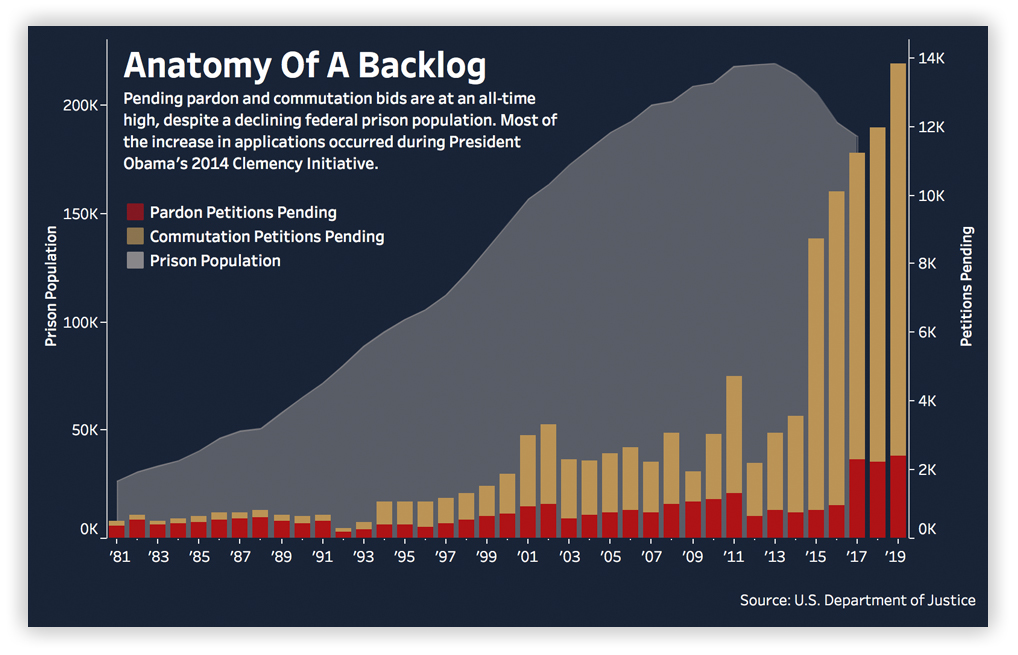We post news and comment on federal criminal justice issues, focused primarily on trial and post-conviction matters, legislative initiatives, and sentencing issues.

BIDEN CARES ACT CLEMENCY CALLED INADEQUATE
We know a little more about the Biden Administration’s plan to solicit commutation applications from some CARES Act prisoners on home confinement, and as more is known, the criticism is mounting.
 A few weeks ago, the Department of Justice started sending out commutation applications to about 1,000 people (about one out of four those on CARES Act home confinement). Biden is targeting people who have been convicted of a drug offense and have four years or less remaining on their sentences, directing them to apply to DOJ’s Office of the Pardon Attorney.
A few weeks ago, the Department of Justice started sending out commutation applications to about 1,000 people (about one out of four those on CARES Act home confinement). Biden is targeting people who have been convicted of a drug offense and have four years or less remaining on their sentences, directing them to apply to DOJ’s Office of the Pardon Attorney.
Last week, The New Republic observed that “Biden is wedded to an inefficient process that’s created a backlog of close to 16,000 petitions. The administration is going out of its way to frame its approach as the opposite of Trump’s chaotic one, which bypassed the Justice Department and freed people seemingly based on the president’s whims.” The New York Times reported last spring that Biden intends to “rely on the rigorous application vetting process,” as opposed to Trump’s approach, “empowering friends, associates and lobbyists to use their connections to the president, his family and his team to push favored requests to the front of the line…”
But the need to rely on the DOJ pardon system doesn’t sit well with some. Last week, Amy Povah, founder of the Can-Do Clemency Project, told Forbes, “President Biden has been handed an easy political gift. There are 4,000 inmates functioning in society, obeying the laws, bonding with family and held accountable for their past actions. There is no better group vetted to be given clemency than this group of CARES Act inmates… If those at home under CARES Act don’t all qualify to stay there, I’m concerned that we’re dealing with an overly conservative mindset, not consistent with the will of those who voted for President Biden.”
“This should be an easy lift for the Biden administration,” law professor Mark Osler, a former Assistant U.S. Attorney, told The New Republic. “They were handed a carefully vetted group of people who even Attorney General Barr thought should be out in society.”
Osler said the system Biden wants to rely on doesn’t work. “The fact that their commitment to a broken process is going to undermine this is really disappointing,” Osler told TNR. He has long argued that clemency cases should be taken away from DOJ. Before a case makes it to the President, Osler said, “the first thing the pardon attorney’s staff do is seek out the opinion of the local prosecutor and then give that opinion substantial weight. What do you think is going to happen?”
 No one is saying whether special considerations will be applied to CARES Act home confinees, allowing them to skip DOJ Pardon Attorney review and that office’s embarrassing backlog of cases. FAMM president Kevin Ring complained last week that outside of what they’ve seen in the media, no one knows what Biden plans. “It’s a crazy lack of transparency,” Ring said. “Friday afternoon, there’s a phone call to BOP halfway houses saying, this person should fill out a clemency petition in the next couple of days. Who? Why? What [are] the criteria?”
No one is saying whether special considerations will be applied to CARES Act home confinees, allowing them to skip DOJ Pardon Attorney review and that office’s embarrassing backlog of cases. FAMM president Kevin Ring complained last week that outside of what they’ve seen in the media, no one knows what Biden plans. “It’s a crazy lack of transparency,” Ring said. “Friday afternoon, there’s a phone call to BOP halfway houses saying, this person should fill out a clemency petition in the next couple of days. Who? Why? What [are] the criteria?”
Unsurprisingly, the pressure remain high for Biden to do more. A week ago, five members of the Maryland congressional delegation wrote to Attorney General Merrick Garland and BOP Director Michael Carvajal, asking for reconsideration of the Trump-era legal opinion (which the Biden DOJ has agreed with) that CARES Act people have to return to prison after the COVID-19 emergency passes. And last Friday, three national law enforcement organizations – the Law Enforcement Leaders to Reduce Crime & Incarceration, Law Enforcement Action Partnership, and Fair and Just Prosecution — wrote to the President to urge him “to use your clemency power to ensure that all people successfully placed on home confinement under the CARES Act do not return to full custody.”
While all of the attention seems to be on CARES Act people, any focus on a re-do of the DOJ pardon system will ultimately benefit prisoners whether still in prison or at home.
Forbes, Biden Considering Options To Avoid Returning Federal Inmates To Prison Post Covid-19 (September 19, 2021)
The New Republic, Biden’s Conservative Vision on Clemency (September 21, 2021)
Maryland Congressional Delegation, Letter to Attorney General (September 17, 2021)
Law Enforcement Action Partnership, Letter to President Biden (September 24, 2021)
– Thomas L. Root





















